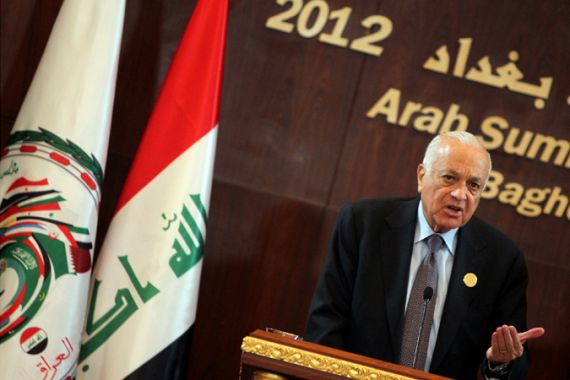Syria crisis dominates Arab summit in Iraq
Violence in Syria continues as regional bloc ends meeting in Iraq with call for Assad to act upon UN-backed peace plan.

Arab League leaders meeting in Iraq have called on the Syrian government to implement a UN-backed peace plan “immediately and completely”, as they met for a summit in the capital Baghdad.
Nine heads of state and UN Secretary-General Ban Ki-moon were among those attending the opening of the summit in the former Republican Palace on Thursday, the first such meeting in Iraq for 22 years.
As the summit got under way, President Bashar al-Assad in Damascus said Syria would spare no effort to ensure the success of international envoy Kofi Annan’s peace mission, but warned it would not work without securing an end to foreign funding and arming of rebels opposing him.
The state news agency SANA reported that Assad, in a letter to the leaders of the BRICS economic powers, who are meeting in New Delhi, “stressed the need to convince the states that support terrorist groups by money and weapons, to immediately cease their support, including the neighboring countries that host these groups and facilitate their terrorist operations against Syria”.
The six-point plan calls for the withdrawal of heavy weapons and troops from population centres, humanitarian assistance, the release of prisoners and free movement and access for journalists.
The US state department described Assad’s remarks on a peace plan as “discouraging”.
At the summit in Baghdad, Arab leaders approved a resolution calling for an end to the government’s brutal crackdown, for the opposition to unite and for parties to the conflict to launch a “serious national dialogue”.
In his speech to Arab leaders, Nuri al-Maliki, the Iraqi prime minister, warned against arming the parties to Syria’s conflict.
“Based on our experience in Iraq, the option to arm either side of the conflict will lead to a regional and international proxy war in Syria,” Maliki said.
‘The world is waiting’
Calling for Syrian authorities to implement Annan’s plan, Ban said: “The world is waiting for commitments to be translated into action. The key here is implementation. There is no time to waste.”
The Emir of Kuwait was the lone head of state to attend from the six Gulf Arab nations.
The arrival of Sheikh Sabah al-Ahmed al-Jaber al-Sabah marked the first visit by a Kuwaiti leader since Saddam Hussein’s invasion in 1990.
Al Jazeera’s Jane Arraf, reporting from the summit, said: “All the rest of the [Gulf countries] sent ambassador-level representatives to a meeting that bring together heads of states for a few reasons.”
“There is still real mistrust of the Iraqi prime minister. He is a Shia leader in a region that is dominated by Sunnis.
“Qatar said that it wasn’t boycotting the meeting but it wanted to send a message to Iraq, the same other message of concern among some other countries. Its concern is that Sunnis in Iraq are continuing to be marginalised.”
While rigorous security arrangements were made ahead of the summit, three explosions were heard in central Baghdad as the meeting took place.
Witnesses said that two blasts hit near the Iranian embassy at the edge of the fortified Green Zone. There were no immediate reports of casualties.
The city has been effectively locked down for the occasion, with 100,000 security forces on alert. Swathes of roads, air space and mobile networks have been shut down.
Meanwhile In Istanbul, Syrian opposition representatives met to try to settle deep internal disputes before the arrival of Western foreign ministers for a “Friends of Syria” conference on Sunday to map out where the year-old uprising is heading.
The latest diplomatic developments came as violence continued across Syria, with anti-Assad activists on Thursday reporting the death of at least 23 people.
In the northwestern province of Idlib, which has been under a relentless army assault since the start of the month, activists said that five civilians, including a woman and a child, died as regime forces stormed villages near the town of Maaret al-Numan.
Activists also said that three people died in nearby Hama province, along with two soldiers who were killed when their vehicle came under attack by armed fighters.
The Syrian army reportedly continued shelling the Homs’ old neighbourhoods and Talbisa district, amateur videos showed.
The UK-based Syrian Observatory for Human Rights said that an army colonel was assassinated by armed men in the northern city of Aleppo, where an officer was also killed on Wednesday.
The state news agency SANA on Thursday said the two officers were killed by an “armed terrorist group” as they were heading to work.
“Four terrorists in a car killed officers Abdel Karim Raie and Fouad Shaaban as they were heading to work,” the agency said.
Clashes were also taking place near the town of Zabadani, a Damascus suburb.
A loud blast was reported in Harasta, also in the suburbs, and plumes of smoke could be seen rising near an army checkpoint.